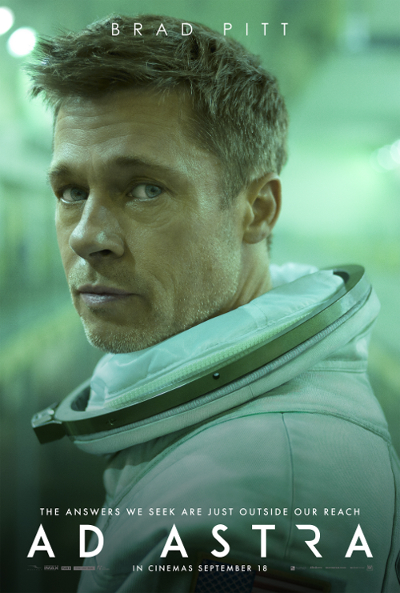Ad Astra vs. Heart of Darkness - Movie review (spoiler free!)
On Saturday, my brother and I went to see Ad Astra starring Brad Pitt. This is a film that's been compared - by its director James Gray, no less - to Heart of Darkness by Joseph Conrad (one of my axes). Being in the middle of a Conrad "renaissance" if you will, I felt it was perfect timing. A couple of my coworkers had seen it already and liked it, so that was another reason I was interested in watching it.
Pitt plays Roy McBride, a young astronaut whose impeccable career is overshadowed by memories of his absent father Clifford and the much-nearer loss of Eve, the devoted wife he sidelined for his career and who's recently left him. After a series of devastating electrical surges sweep across the solar system, Roy is tasked by U.S. Space Command to investigate the situation, which they believe could be linked to his dad's scientific research on Neptune. Roy sets out to confront Clifford, embarking on a journey through space that is every bit as perilous as his final destination.
While I would not call this a retelling of Heart of Darkness, there are indeed several similarities between this film and that novella. Roy's story takes him further and further into isolation, both geographically and psychologically. Like Conrad's narrator Marlowe, Roy has an immense amount of time before he meets Clifford, and this waiting fills his mind with doubts, fears, and an overwhelming curiosity. The hand of empire is as present here as in Conrad's book - Roy remarks cynically on the presence of governments and corporations on the Moon as he passes through it on his way to Mars. Throughout the film, Pitt voices Roy's dark and lonely monologue, which is dissimilar from Marlowe's in that Roy's depression has elbowed out any sense of humor he once had.
The most fascinating - and perhaps the most Conradian - element of the film was its dystopian portrayal of space exploration. This came to me as a complete surprise, since I am used to it being portrayed in Western media as noble and heroic. The film makes significant references to imperialism and even a passing reference to Manifest Destiny as it describes the exploits of the human race in space. It doesn't outright dismiss it, but there are very few positives mentioned or portrayed. It can be debated whether this is just Roy's bleak outlook or also the filmmakers'.
I do have to mention a couple of weak points in the plot. There is one scene where the character makes a stupid decision which doesn't seem to fit his otherwise cerebral persona. Another scene involving monkeys seemed extremely random, though effective as commentary on humans' behavior. Thirdly, the ending was not at all what I expected - not in a bad way, just unexpected.
Comparisons aside, Ad Astra is a compelling standalone film with plenty of questions and commentary. It focuses heavily on psychological suspense, and I think even those who aren't sci-fi fans can appreciate the realism and near-futuristic setting. There are some gruesome scenes and brief bad language, so it's not a movie for young kids. As a squeamish person, I thought it stayed within PG-13, though, and was mostly non-gratuitous.


Comments
@mudpuddle - What I will say is, there really aren't any jump scares. So there's enough time to look away, or fast-forward if you're watching it on DVD. :)
You know, I might host a Heart of Darkness read-along at some point. Not soon, perhaps in January. I've been meaning to re-read it as well as literary criticism on it.